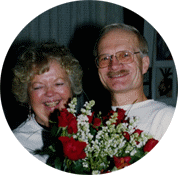
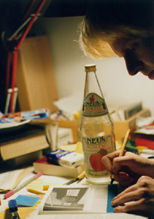 new
version 10/99
new
version 10/99 Learning
How to find a nice balance between learning and acting? I always want to do both. For some years I forced my parents to open their books far more often than they were used to. My sister suffered a severe shock the day she discovered, that I do not know all that what I pretended to know (Nele, the time was great anyway, isn't it? :-) I was happy, however, to be allowed to go to the kindergarden (hi Gorm, where are you? - I found the idea, to throw burning pieces of paper out of the window, which had swasticas on them rather strange, but I will never forget, that there was "a Danish king, called Gorm..."), and then to school (by the way, Alexander, what are you doing today? - I will never understand, what made us buying Playmobil soldiers in dozends...).

This institution offers quite a few opportunities to learn. Anyway, 13 years of schooling are rather too much. I do not at all understand anymore, why leftist youngsters - like me at the time - are against shortening the years of schooling in Germany? What is bad with the idea, to change to university with its far greater choice and freedom at the age of 18/19 instead of 19/20? Irish and Belgian university students, however, register at university already as minors, what gives the parents too much influence, that can not be the goal neither. But why not at the age of 18?
Anyway, school is not life. You can also go to the local library and fetch a basket of books every week (I remember especially the very animating counsils of a young librarian, whose name I do not know anymore). Never to forget the two ladies who helped my parents three times a year to buy a pile of childrens' books at their bookshop "KiBuLa"...
By the way: Never throw a stamp away! Stamps
can make Malte happy, so why to grant them to the garbage? I assure you, that
you will never have to regard my stamp collection, when you come along (a German
running gag), you only have to have a glimpse on my pictures...
Doing
There came a moment when I did not want to go on with purely consuming ideas, but wanted to share them with others (and not only putting all the burden of listening onto Nele perhaps...). Two opportunities opened the way: Lars (thanks for the years of great co-operation!) and mine school newspaper "Kurzschluss", followed by the local Young Socialists, run basically by Christian (I am still convinced, that it makes more sense to laugh about politicians than to get depressive, how about you today? :-)) and me.
"Kurzschluss" and Young Socialists were also great opportunities to learn, how to work fruitfully together with other people having different motivations and ideas, but always reaching consensus and results at the end (Hey Mirko, that's it, what leads to satisfaction - using other human beings only as tools for your own personal purpose will never satisfy yourself!).
The courses of mathematics for school pupils held at Hamburg university where of a different kind. In the beginning the interest in mathematics and the solving of logical problems was predominant. With time, the chat of breaks and evenings became so important, that there was really no sense to stay anymore, not to disturb the people seriously working over there. Hi, Thomas you also started to work more, when I left, wasn't it? Still regrettable, however, Basti, your removal to Bielefeld - I always had the impression, to get my brain doubling its rotation, while talking with you. Perhaps it was rather a one-way, but sad, to have lost you somewhere anyway.
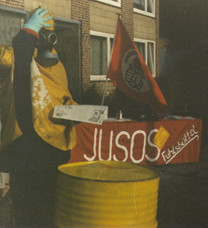
Doing politics can be very
stimulating, especially if you understand it as enhancing dialogue among people.
Campaigns on the streets tell you, that the people out there are much better
informed and have a much better political judgement than all party officials
together can imagine - referendums are a must! We experienced at the same time,
that it is not difficult at all to motivate people for social and political
goals, if you only allow them to estimate effectivity and time consumation from
the outset.
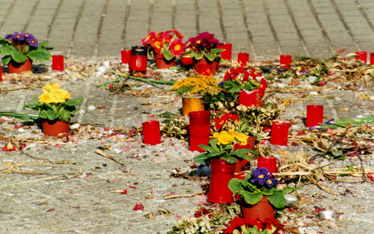
The poor people who invest themselves fully there, do soon not have any perpective outside "the machine" anymore. The main reason, why we can never get rid of bad politicians: they do not know, what to do else...
The best experience was the Peace Movement. There we were really able to get beyond politics as a game of friend and ennemy (Carl Schmitt) and to work together, bridging huge differences (between communists and lutherans for example). Without your great work of holding this club together, Dirk, I would perhaps share most peoples' view, that this is impossible.
Final stages
The obligatory social service
gave insight in social conditions not known before, gave the affirmation, that
I am not too lazy to stand full time work getting up in the morning at 6 am,
the joy of equal working relations with mentally handicapped without a glimpse
of false pity and the discovery that mental handicap is much more a social than
a medical indication. Even if it was not too nice, to become "ill" for 6 months,
just the very moment, I had started working on my own, Horst - thank you and
the others anyway :-)

I always regarded Hamburg as the most beautiful city I know: very green, very much water, an open spirit, a cultural and economic metropolis which does not need to demonstrate its greatness every day - just "Heimat". Today, I also see the far to large space given to cars in the city, the lack of cosy corners, the awful dominance of concrete buildings in big parts of the city centre, but it rests an advisable place in any case :-). Funny, that I got to know my best friend from school, only the summer after finishing school: Ralph, I am really happy about our trip to Hungary and beyond - we would probably never have stayed in contact as long. And thanks a million for all the help I got from you!
Mannheim
Now goodbye Hamburg! Leaving the parents' home, exploring another corner of germany with its different mentalities, attending a less overcrowded university, getting rid of the long distances by moving to a smaller city... Mannheim on the banks of Rhine and Neckar with its unbeatable good wheather...
Soon I learned that mannheim is not small, it is at least medium sized :-). It is situated in a small country called "Kurpfalz", surrounded by hostile neighbours who are so extremely different (Suabians, Badenians, Palatinatians, Hessenians and all their subgroups)... Mannheim is rather not so known in Germany but maintains one of its best theaters, a beautiful university, a compact city center and is for Palatinate and Baden-Württemberg something like the door to the outside world. Brief: nice place to live for some years (... and how i miss its sun!).
However, how comes that some cities have a stronger spirit of intellectual thought, a stronger sense of modernity, a livelier public debate and others less? What is provinciality and where does it comes from...?
Changing to mannheim for
studies was an expression of the strong desire to restart intellectual learning.
Political activities were reduced to project oriented and time limited work.
I started searching for a good balance of work, engagement, "Muße", learning,
reflection and exploration.
Studies were as much a time
of social contact. Three-hour lunchbreaks (Christian, are you still explaining
Marx to business simpletons?), midnight-gaming brunches (Martin, why not having
some spaghetti?), talk and exchange of ideas (Nic and Monika, your parts do
not fit into brackets, but you are aware of it anyway, isn't it?). A new experience:
for the first time lots of friends! One day on a visit in Hamburg I realised
that entering a pub I was automaticlly looking around, if I wouldn't know someone
- just a mannheim habit... (Toepfl, how is it going?)
Nevertheless, it turned out that university is not more detached from society than school is, and that it can be quite boring to study if there are too many people around who are only interested in passing the exams rather than exploring the subject.
Nonetheless: university lectures
are an offer one can make use of or not, but how to do it, if they are always
just in the very moment there are other interesting things coming up? :-) -
again, libraries reveal themselves as main source of intellectual inspiration,
accompanied now increasingly by second hand book shops and the like...

While the questions raised by political science do interest me more, it seems to me that i can work much longer on history subjects. However, probably both are more interconnected than one might think. My main interest are societies and cultures in comparison. why countries develop differently? and how to learn from the other's experiences?
As the studies proceeded,
one question became bigger and bigger: The huge number of single elements, which
make up our picture of the world, where do they come from, who thought them
first, how comes, that they seem to build a coherent network while deriving
from more than 2000 years of (political) thought?
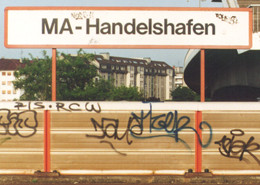
This stay in southern germany
and even more the year in ireland taught me about the immense cultural differences
between societies which - seen superficially - don't seem to be too different.
The main difficulty is for me to understand when an expressed yes is meant to
be a no. Sorry to a friendly guy from the Irish Labour party, which I annoyed
a whole evening by ignoring his desperate hints for me to leave.
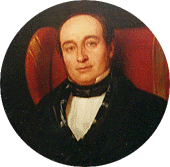
Brussels
Removal to Brussels, secretary
of the Federation of the Young European Greens, other jobs aside, European Commission,
ngo's, a bit of journalism, translations, learned French and Dutch... Thanks
to Karlheinz, Ilka, Hans and Magali for making a professional start possible.
Friends are coming and going far too fast in this city of constant fluctuation,
special greetings to Christian, Petra and Wolfgang!
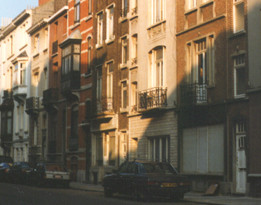
Nevertheless, the most interesting
point in Europe (and in the work of the FYEG for example) is to watch how people
from different political cultures learn about their differences and how to come
together. The one main rule is, that fundamental differences always appear in
the very moment you would never have imagined them to appear. Thanks to all
those great people from the FYEG for your more than two-years of companionship
(with special regards to Stefan)!
Doing "alternative" city tours
for the association ARAU and urbanistic as much as political writings for the
Brüssel-Rundschau means deeper studies of Brussels and Belgium - a very
interesting field, which will continue to interest me for a long time. Again,
like in Ireland, i have the impression that the size of a country is a very
important source of specificies in the political culture.
Belgium is a good example for the thesis that countries which have to handle a deep cultural split tend to end up in meanmongering and corruption, because everybody has to work together and opposition is virtally nonexisting. However, the main question in this respect remains, how to improve the situation. moral judgements are senseless if there are no ways out of misery.
But why talking about misery?
disrespect for rules and high impact of personal relations have all the time
two aspects: Yes, they are often exclusive and serve a minority to rule about
the others - but at the same time they allow for flexibility and help you not
to become too serious on anything.
The internet offers some interesting opportunities, I am dreaming of an historico-philosophical hypertext network of thoughts and findings on historical conciousness, not just a network but a coherent multilinear discussion...
How to find the way back to academic work? How to combine my interests with a ph.d. and gaining a living? While staying together with adorable Gaëtane in the thrilling city of Brussels? Happy for all your recommendations,
Malte.